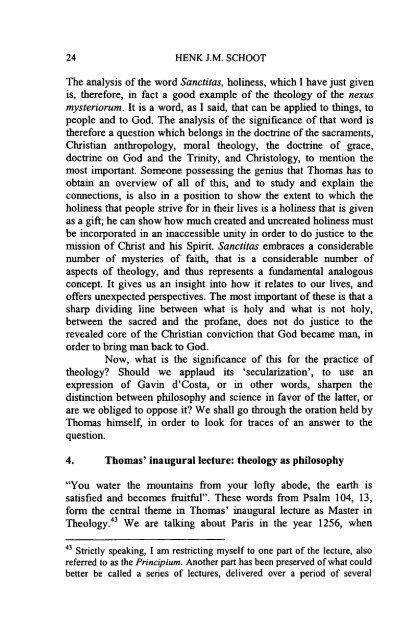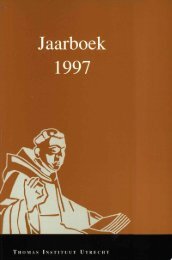Jaarboek Thomas Instituut 2006 - Thomas Instituut te Utrecht
Jaarboek Thomas Instituut 2006 - Thomas Instituut te Utrecht
Jaarboek Thomas Instituut 2006 - Thomas Instituut te Utrecht
You also want an ePaper? Increase the reach of your titles
YUMPU automatically turns print PDFs into web optimized ePapers that Google loves.
24 HENK 1.M. SCHOOT<br />
The analysis of the word Sanctitas, holiness, which I have just given<br />
is, therefore, in fact a good example of the theology of the nexus<br />
mys<strong>te</strong>riorum. It is a word, as I said, that can be applied to things, to<br />
people and to God. The analysis of the significance of that word is<br />
therefore a question which belongs in the doctrine of the sacraments,<br />
Christian anthropology, moral theology, the doctrine of grace,<br />
doctrine on God and the Trinity, and Christology, to mention the<br />
most important. Someone possessing the genius that <strong>Thomas</strong> has to<br />
obtain an overview of all of this, and to study and explain the<br />
connections, is also in a position to show the ex<strong>te</strong>nt to which the<br />
holiness that people strive for in their lives is a holiness that is given<br />
as a gift; he can show how much crea<strong>te</strong>d and uncrea<strong>te</strong>d holiness must<br />
be incorpora<strong>te</strong>d in an inaccessible unity in order to do justice to the<br />
mission of Christ and his Spirit. Sanctitas embraces a considerable<br />
number of mys<strong>te</strong>ries of faith, that is a considerable number of<br />
aspects of theology, and thus represents a fundamental analogous<br />
concept. It gives us an insight into how it rela<strong>te</strong>s to our lives, and<br />
offers unexpec<strong>te</strong>d perspectives. The most important of these is that a<br />
sharp dividing line between what is holy and what is not holy,<br />
between the sacred and the profane, does not do justice to the<br />
revealed core of the Christian conviction that God became man, in<br />
order to bring man back to God.<br />
Now, what is the significance of this for the practice of<br />
theology? Should we applaud its 'secularization', to use an<br />
expression of Gavin d'Costa, or in other words, sharpen the<br />
distinction between philosophy and science in favor of the lat<strong>te</strong>r, or<br />
are we obliged to oppose it? We shall go through the oration held by<br />
<strong>Thomas</strong> himself, in order to look for traces of an answer to the<br />
question.<br />
4. <strong>Thomas</strong>' inaugural lecture: theology as philosophy<br />
"You wa<strong>te</strong>r the mountains from your lofty abode, the earth is<br />
satisfied and becomes fruitful". These words from Psalm 104, 13,<br />
form the central theme in <strong>Thomas</strong>' inaugural lecture as Mas<strong>te</strong>r in<br />
Theology." We are talking about Paris in the year 1256, when<br />
43 Strictly speaking, I am restricting myself to one part of the lecture, also<br />
referred to as the Principium. Another part has been preserved of what could<br />
bet<strong>te</strong>r be called a series of lectures, delivered over a period of several








